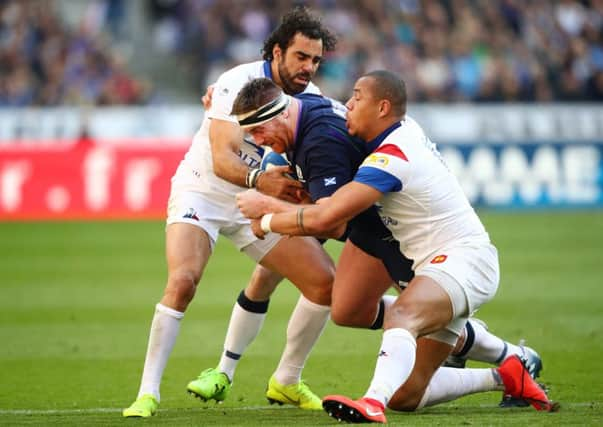Allan Massie: Scots had Paris off-day but can push Wales all the way


Still, as to the other two: first, you might say it was one of those days when a good team never quite gets going, when it looks slow of mind and foot, and consequently mistakes abound; second, you might say that, though we probably do have more strength in depth than before, this isn’t so great that we can overcome the loss of six or seven first-choice players, among them our two most dangerous backs and most experienced flankers.
There’s something to be said for both explanations. One had a nasty feeling very early in the match that things were going to go wrong. We got a penalty in our 22 immediately after the kick-off. Blair Kinghorn found touch and then we lost the lineout on our own throw. A small incident but one that set the course for the game. We were rarely secure in possession and for the first hour at least almost all the ball we won was slow. There were too many defensive mistakes of the kind which at Test match level should be avoidable and which are usually punished. In the end we could be thankful that the margin of defeat wasn’t greater.
Advertisement
Hide AdAdvertisement
Hide AdAs to the second explanation, obviously a Scotland XV without Stuart Hogg, Finn Russell, John Barclay, Hamish Watson and – I would add – Huw Jones is weaker than one that includes them. It may be that some of the replacements are never quite going to cut it at international level, no matter how good they look in club matches. There’s nothing new or discreditable about this. There have always been outstanding club players – and not only in rugby – who never or only very rarely were really successful in the international game. Brendan Laney was one such: a great player for Edinburgh, less than great for Scotland. Frank Hadden, coach of both Edinburgh and Scotland, once remarked that he was the most naturally talented player he had had in his squads. Yet his international career, despite the occasional good game, was very disappointing.
There was fierce argument some 30 years ago about whether Rob Andrew or Stuart Barnes should be at stand-off for England. Both were players of rare ability. The selectors usually opted for Andrew, though anyone who watched Barnes play for Bath might regard him as a genius. I doubt if anyone ever called Rob Andrew a genius, but he was one of the best international stand-offs I have ever seen. His judgment under pressure was excellent, as Barnes’s wasn’t. So, while Barnes was probably the better club player, Andrew was the better Test match one.
Back in the Eighties you were likely to be delighted by the play of Kelso’s stand-off Andrew Ker. On his day he was a wizard, inventive and assured, one of these players who seemed to have more time on the ball than others. He couldn’t do much that John Rutherford did, but what he did,he did supremely well. Yet, even when Rutherford was injured in both the 1983 and 1985 Five Nations, the selectors didn’t turn to Ker but preferred the less talented but very competent Brian Gossman. Ker did eventually get a couple of caps in 1988, without much success. The second was, admittedly, in the dullest Calcutta Cup I remember, a painfully slow match of endlessly reset scrums, and one in which it seemed that an English player went down injured whenever Scotland seemed to have any momentum. It was so boring that I stopped caring about the result and longed for the final whistle.
We hope naturally that some of those missing in Paris will return against Wales next week. But even if they don’t, I would expect the same Scotland team to give the Welsh a much harder game than they gave the French, and quite possibly to win. Form doesn’t necessarily translate from one week to the next – as England discovered against Wales in Cardiff. Those of us who thought – feared? – that England might be cantering to a Grand Slam now look pretty foolish.
Certainly Wales are a very well-organised side with a good defence. Nevertheless it was extraordinary how England ran out of ideas and surrendered control; extraordinary too, given the importance now attached to the strength of your bench – to those whom Eddie Jones last year termed “the finishers”– that he made so little use of replacements, especially since both Owen Farrell and Ben Youngs seemed to have lost their way, while George Ford is a more creative stand-off than Farrell and Dan Robson a livelier attacking scrum-half than Youngs.
But of course it’s not only players who have off-days as so many Scots did in Paris and Farrell and Youngs did in Cardiff. Coaches, too, have days when their judgment deserts them, and they fail to make good use of the players-in-waiting.